 While flying home Saturday, I reflected on our four weeks in New Zealand. Kiwis kept asking us along the way, “What have you enjoyed most?” And I couldn’t tell them. We enjoyed so many things. You might think it’s a no-brainer; that everyone should go to New Zealand, even you. But the truth is more complicated, I think.
While flying home Saturday, I reflected on our four weeks in New Zealand. Kiwis kept asking us along the way, “What have you enjoyed most?” And I couldn’t tell them. We enjoyed so many things. You might think it’s a no-brainer; that everyone should go to New Zealand, even you. But the truth is more complicated, I think.
Two reasons NOT to go to New Zealand seem evident (to me).
- It’s REALLY far from almost everywhere. For our flight from Auckland to San Francisco, we were aloft for almost 12 hours (and then it took hours more to get home from the Bay Area.) That’s a long time to be cooped up in a metal tube at 36,000 feet. Even if the flight is free (as it was for us, using frequent-flier miles), the long passage takes a toll.
- The New Zealand dollar has lost almost a fifth of its value against the dollar over the last four years. But travel there still feels no less expensive than it is in the US. Meals in restaurants cost about the same, as do hotels — and why not? New Zealand is at least as advanced a country as America. If you’re on a budget, so many other destinations offer much more bang for the (US) buck (e.g. Ecuador or India or Vietnam or Portugal, etc.)
On the other hand, you still might want to come to New Zealand:
3. To experience nature. My good friend (and travel blogger par excellence) Doris has commented as she’s read my posts that she’s not terribly interested in New Zealand because it looks a lot like Iceland (where she has already traveled). I haven’t been to Iceland yet, but I don’t doubt that’s true. However, I’ve retorted that New Zealand is also carpeted with vast emerald farmland that reminded me of Ireland. It has deer farms…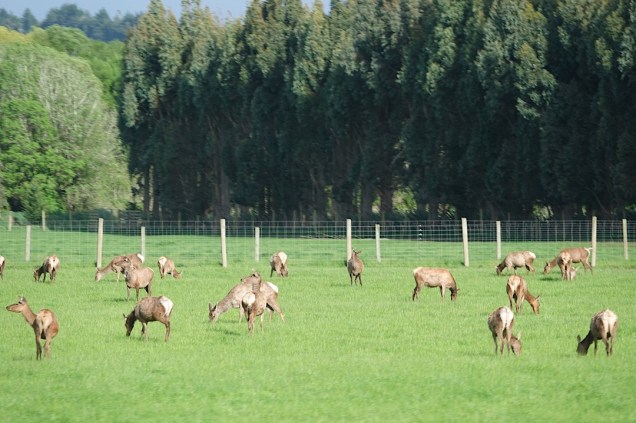 and The Shire.
and The Shire.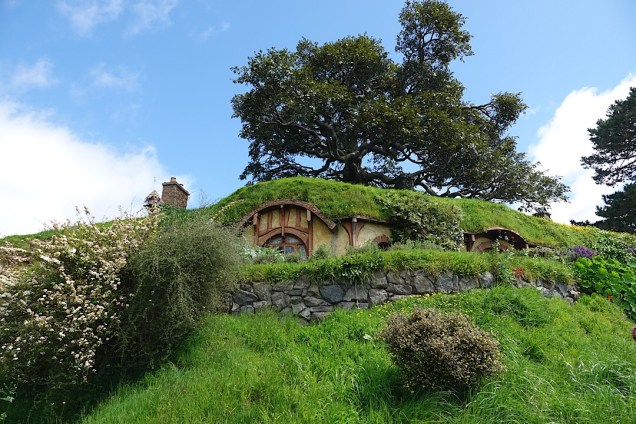 We drove through stretches of the South Island interior that felt like the American Southwest. We hiked through tropical rainforests that filled me with a sense of rapture. We floated through those caves illuminated only with incandescent larvae. We walked on beaches devoid of people but filled with sensuous driftwood.
We drove through stretches of the South Island interior that felt like the American Southwest. We hiked through tropical rainforests that filled me with a sense of rapture. We floated through those caves illuminated only with incandescent larvae. We walked on beaches devoid of people but filled with sensuous driftwood.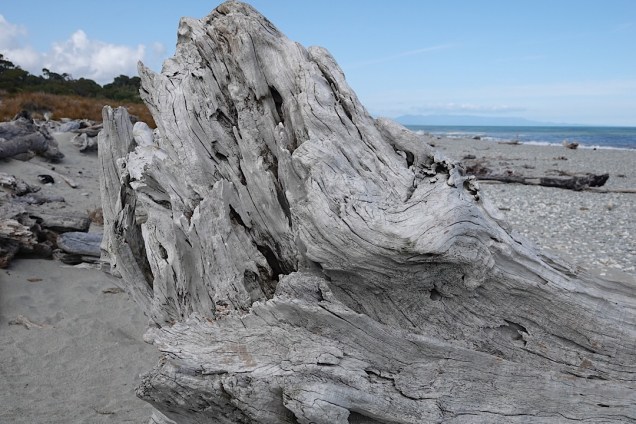
Steve and I partly went to New Zealand at this point in our lives to take advantage of the hiking and trekking we’d heard about. We were not disappointed. Indeed Kiwis struck us as having more of a passion for striding through the outdoors than any place else we’ve been.
On the other hand, you can enjoy tremendous natural beauty in America too. It may be less concentrated than it is in New Zealand, but you don’t have to travel as far to get to it (see point number 1 above.)
4) Related to but different from coming for the nature is coming to participate in crazy action sports. Bungee jumping was invented in New Zealand…
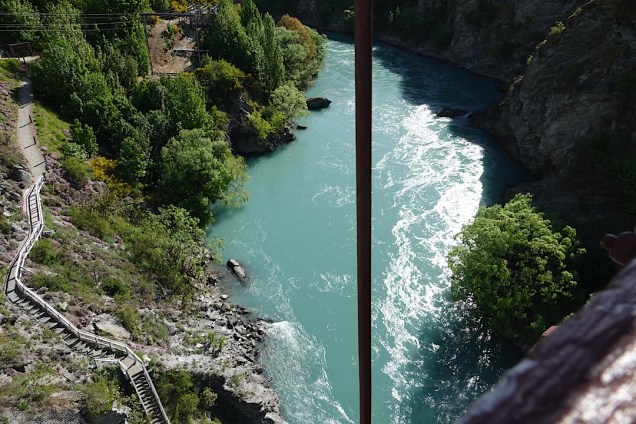
To that a head-spinning list of other crazy adventures have been added: luging, sky-diving, jet boating, paragliding, whitewater rafting, and more.
I used to think maybe this was a marketing ploy — something Kiwis had dreamed up to attract tourists. Maybe there’s some truth to that, but over the past few weeks, Steve and I have come to think it also reflects something in the character of New Zealand’s residents. They appeared to us to be tough, hardy folk. Seeing the “pleasure” sailors out on Auckland Bay in icy winds so strong they would have caused the issue of small-craft warnings in San Diego… …watching a dad ignore his toddler daughter making her way up the climbing wall at the fabulous playground in Christchurch…
…watching a dad ignore his toddler daughter making her way up the climbing wall at the fabulous playground in Christchurch… … or trekking with the gang on the Routeburn in the storm. It made us suspect New Zealanders relish the wild adventure options themselves.
… or trekking with the gang on the Routeburn in the storm. It made us suspect New Zealanders relish the wild adventure options themselves.
5) New Zealand exposes one to a different relationship between native peoples and their Anglo invaders than anywhere else we could think of. We didn’t know this before we came. We understood little to nothing about kiwi history. Learning that the first humans didn’t set foot on either island till around 1200 AD — and that they were Polynesians (hailing from Fiji or Hawaii or similar islands) startled us. The Maoris (as those first New Zealand settlers became known) had lived here less than 500 years before Captain Cook arrived. The Englishmen (and other white folk) who flocked here after Cook’s reports managed to get a whole bunch of the land out of the Maori hands.
But about 100 years after they did, the pendulum began to swing the other way. The Maoris have since gotten some stuff back. Reparations have been made. (We heard at one point that more than 98% of the “reconciliation” process has now been completed.)
The net result is that today, to us hasty visitors, it looks as if Maoris enjoy more respect and a more central place in New Zealand society than the natives anywhere in the Western Hemisphere. We liked that.
4) Visiting New Zealand is more like visiting one of the planets in the Galactic Association than anywhere else we’ve ever experienced. (The Galactic Association is Steve’s science-fictional invention. It promotes settlement of 8 planets by pioneers from earth.)
Before the first humans arrived just 800 or so years ago, no mammals lived in New Zealand (except for three tiny bat species.) It was all birds, a vast variety of them, including the giant flightless moa and the huge and terrifying eagles who hunted them.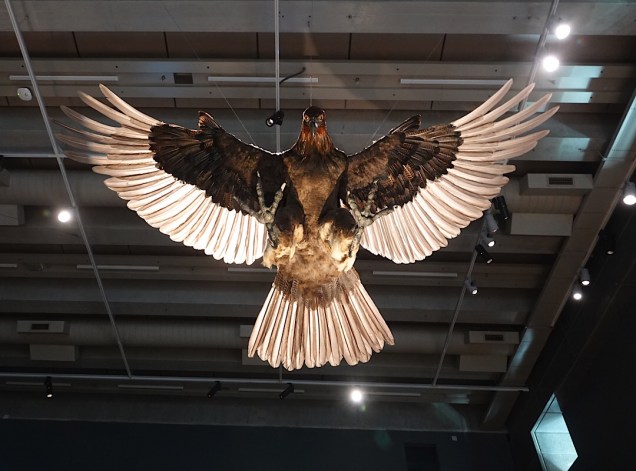 The Maoris brought invasive dogs and rats, and other animal (and botanical) invaders followed. Battles between the natives and the alien predators are being fought intensely today.
The Maoris brought invasive dogs and rats, and other animal (and botanical) invaders followed. Battles between the natives and the alien predators are being fought intensely today.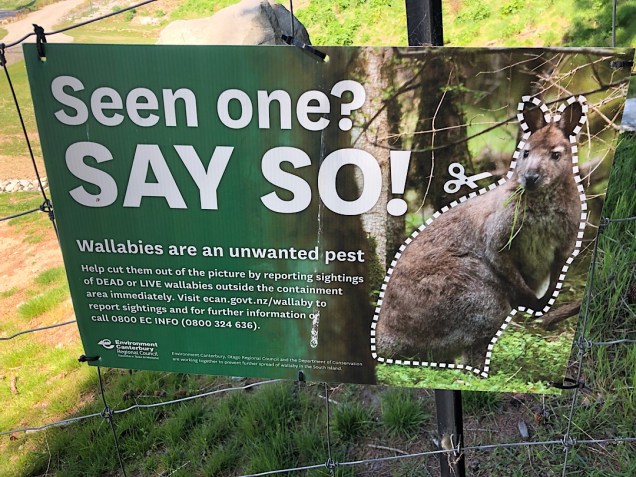
Still, where else on the planet can you hike through wild, wild country and know there are no bears, no snakes, no big cats or elephants — just birds, whose songs are slowly fading as the possums and wallaby and rats eat them?
Is that a good reason to travel to New Zealand? Certainly all of those (except for the adventure sports) were reason enough for us. As a bonus, we have memories of being stopped on that road to let modern shepherds guide their flocks across the highway.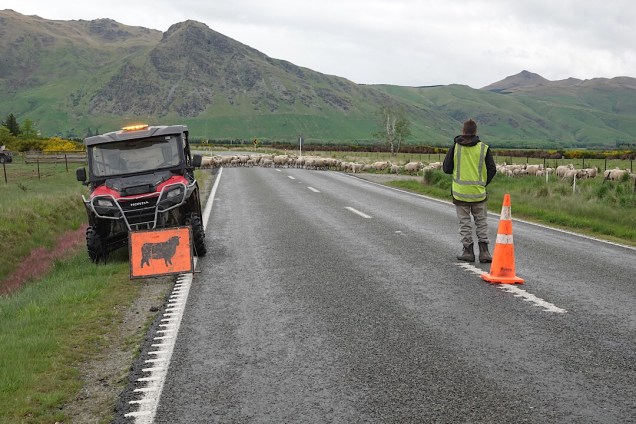

There were amazing skies…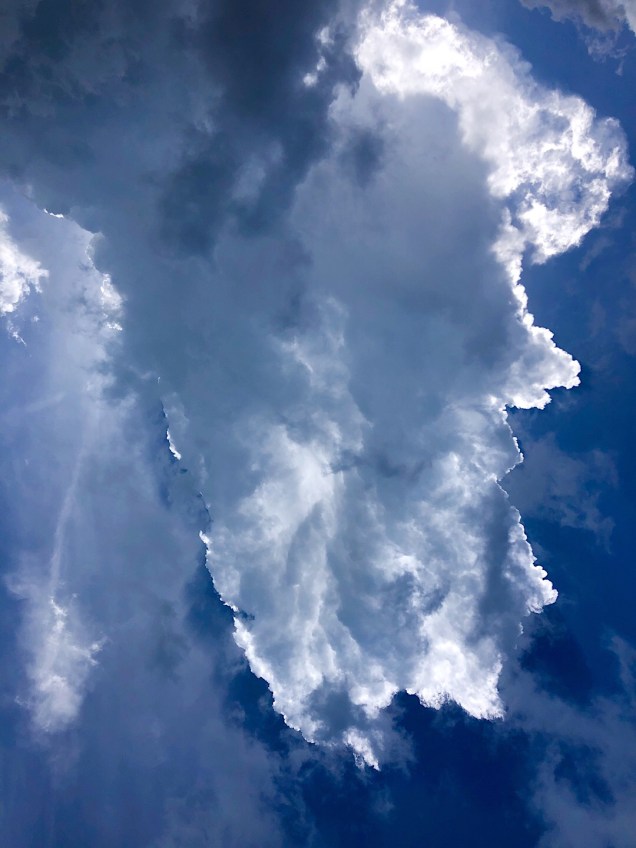 and magnificent trees.
and magnificent trees. 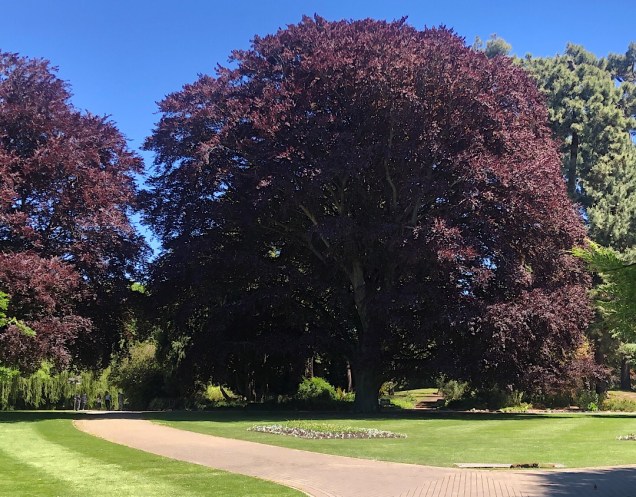
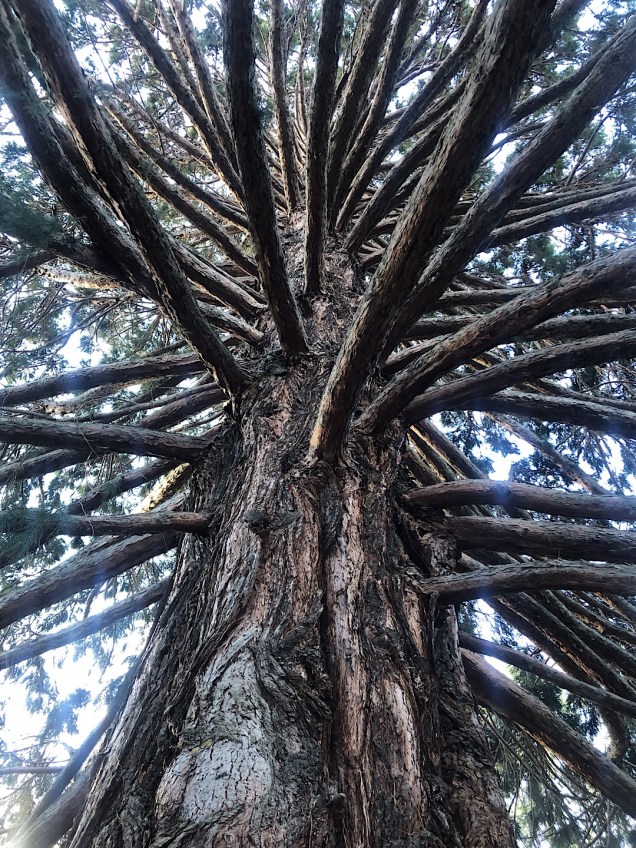
I’ll probably forget most of it. But part of why I write this blog is to help me remember. 
Welcome home, we’ve enjoyed traveling with you vicariously. I agree with all of your summation because in New Zealand it is all true; everything is true even when it defies logic. It is unfortunate that they appear to be returning to a colonial state no longer beholden to Britain but now as a major supplier to the Chinese. I wonder where this will lead in the generations that follow.
Welcome home! It sounds like it was an amazing trip. Thanks for sharing yet another of your amazing adventures. I was surprised to read that you were told the rats came with the first human settlers. When we visited Zealandia Ecosanctuary in Wellington, one of its founders said the rats came with the English ships. Regardless, the plan to restore the original fauna (or at least those species that have not gone extinct) will require mass extinction by aerial drops of short-lived poisoning (of every living creature) and reintroduction of native species. Despite this biologist’s absolute certainty that nothing could go wrong, it made me distinctly uncomfortable.
We heard about the rats and dogs from several museum displays and staff. Apparently the first Polynesians also brought pigs and chickens, but they didn’t survive! We didn’t hear about the kill-them-all plan to restore the natives. Maybe that’s been rethought…
When were you guys there?
Great summary! I love the last photo. I’m going to try to remember that slogan.
I resolved to make it my new motto. (It also reminded me of you and Howard!)
Thank you for your beautiful entries. My husband and I are planning a trip mid-February through the end of March and are taking in much of the same routes you experienced including the Ultimate Hike of the Routeburn Trail.
How did you manage food for the month? Was it easy to find places to eat or grocery stores in all the small towns?
Also, how did you pack for the long trip?
Thank you.
Joanne
Wow, that’s great you’re doing the Routeburn Track! Hopefully you’ll have beautifully warm and sunny weather. One piece of advice I can give you, if you’re using Ultimate Hikes, is to plan to use their backpacks. Steve and I brought our own, but then we tried theirs (which they offer for free) and decided they were better. We of course still had to stow the rest of our luggage while we were on the trek, but we did that at the JUCY Snooze in Queenstown, where we were staying before and after the trek. It’s just down the street from Ultimate Hikes. Their raincoats (also free) were also better than the ones we brought with us.
We traveled for the month with carry-ons and small (“personal item”-sized) backpacks. I think I took three pairs of long pants, one pairs of capris, and a skirt. And the skirt was not the greatest idea. It was so chilly pretty much everywhere, I had to shop for a pair of tights to wear with it. (And then it was fine.) Other than that, I took a number of t-shirts, but also several layers of sweater/jacket type things, and that kept me warm enough.
The ONLY place we felt we made a mistake about food was the night we spent in Mt. Cook National Park. Our hotel turned out to have a kitchenette, and we really regretted not bringing at least breakfast supplies with us. There isn’t a single grocery-type place in the little town were we were staying in the park.
Otherwise, we had no food shortages anywhere. We ate a surprising (to me) amount of good, economically priced sushi, but also lots of lamb and other delicious things.
I hope that’s helpful!